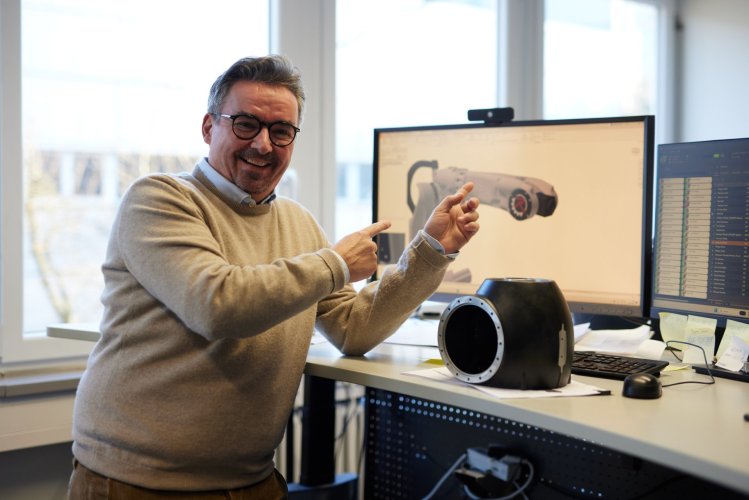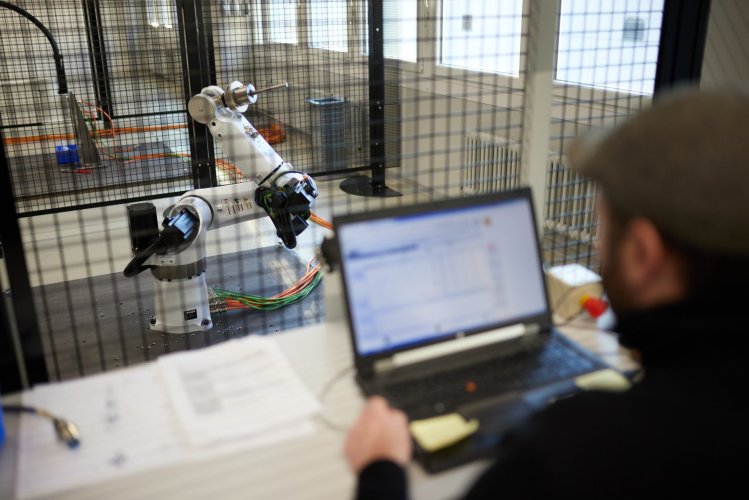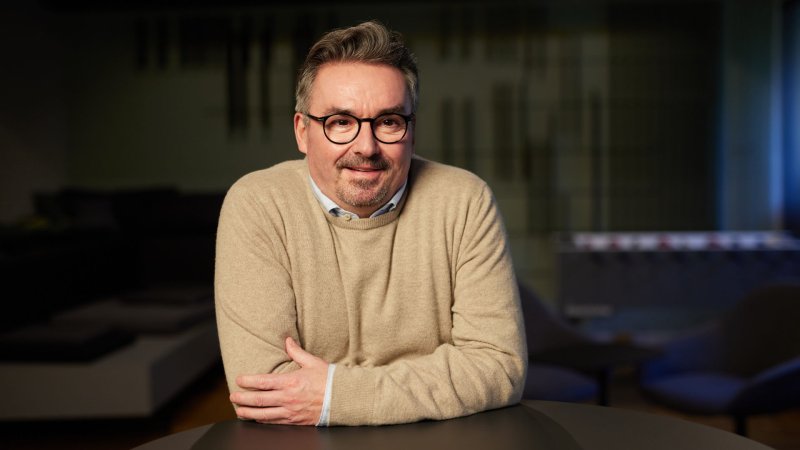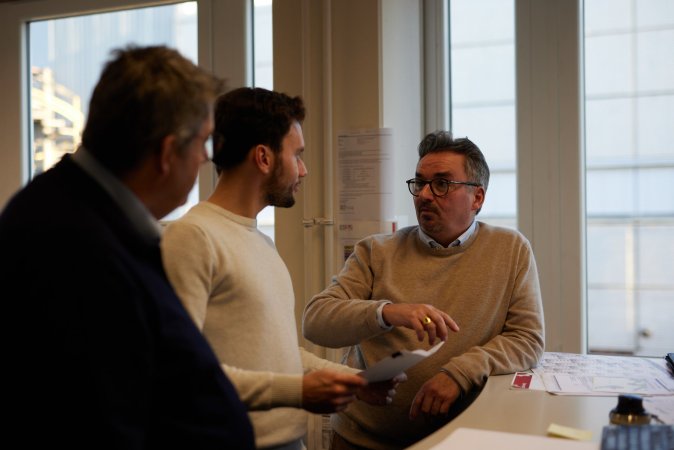“Nobody thought about the robot mechanics. Or dared to ... ”
Actually, Hartmut Ilch just wanted to bring a bit of high-tech into a company. To pass on his knowledge, as he is well versed in automation technology. He doesn't want to have his own product.
21 years later, he can look back on his own company with the largest portfolio of controller-independent robot mechanisms in the world. He did it after all: his own product. And has delighted countless customers from all over the world. And not just them, by the way. His former corporate customer advisor at Volksbank eG - Die Gestalterbank, Klaus Deutscher, is also impressed by the medium-sized company.
That's why we met up with the two of them for an interview today: Hartmut Ilch, Managing Partner and Klaus Deutscher, new CFO of autonox Robotics GmbH.
Willstätt, a municipality in the north-west of the Ortenau district. Decades ago, BASF operated a large magnetic tape factory for audio and video cassettes here. But those days are long forgotten. When you enter the large site today, you literally have the feeling that you can touch the future. The air is filled with the rhythmic sound of machines, the whirring of electric motors and the clacking of grippers, interrupted only by the sudden hissing of hydraulic systems. Hartmut Ilch and his company autonox Robotics GmbH have set up shop on this site. There is security at the entrance, a fire department on site and it is not possible to enter without authorization. But what happens behind these doors?
Hartmut Ilch, thank you very much for taking the time today. You are the founder and Managing Director of autonox Robotics GmbH. The term autonox probably makes many people think of the automotive industry. Does that apply to your company?
Hartmut Ilch: *laughs* Yes, you're not the first person to interpret it that way. But no. I launched my first product on the market in 2010 under the brand name “autonox” and since then we have been a developer, manufacturer and supplier of control-independent robot mechanics. To explain: “auto” stands for automation and “nox” for inox, i.e. stainless steel. At the time, I thought we only made stainless steel robots. Today, however, that is only a small part of what we supply.
You just emphasized that you published the product under the brand name autonox. So your company was called something else?
Hartmut Ilch: Exactly. I founded - co-founded, I must say - the engineering office MAJAtronic 21 years ago as a subsidiary of the MAJA Group. Back then, the owners approached me - a family of entrepreneurs from here whose company was already a good 50 years old at the time - because they wanted to integrate more automation technology. I agreed to set up an engineering office together because it was clear to me: “I don't want to have my own product, but I would market my knowledge to the parent company and other companies.”
Quick question: Where did you get this expertise in robotics from? Personal interest?
Hartmut Ilch: I'm a crazy roboticist. *laughs* I did an apprenticeship here in a mechanical engineering company in the small village of Leutesheim. Turning, milling and manually manufacturing parts - I learned everything from scratch. I really enjoyed that. Then I studied mechanical engineering. And then during my studies I joined the Fraunhofer-Gesellschaft, Institute for Production and Automation Technology, in Stuttgart. That was in the early 90s and was like another planet for me. What I had previously welded by hand was now done by robots. Since then I've been flashed by robots. Crazy about robots. And then I only worked in robotics, robot programming and system planning. I would say I was and still am fit in automation technology.
Wow, your passion is really inspiring, Mr. Ilch.
Hartmut Ilch: In 2019, I took over all the shares in the company with the help of Volksbank eG - Die Gestalterbank, so I've been the sole shareholder ever since, and I renamed the company from MAJAtronics to autonox Robotics.
“No own product” - so you threw this resolution overboard after all.
Hartmut Ilch: Because of a robotics project for the production of meat skewers.
That actually sounds quite common, doesn't it?
Hartmut Ilch: I thought so too. It was clear to me that we could solve it with robots. So we searched the market for robots that could be used for food production. But none of the major robot manufacturers had a hygienic design robot that could really meet the requirements, i.e. that could be foamed and cleaned with hot water under high pressure. That was the moment when I thought: “If there are no hygienic design stainless steel robots, then I'll just do it myself.” And then we started developing our own product in 2006. We knew a lot about hygienic design and robotics, so we literally spent four years developing in a closet - in a garage at first, in fact. *laughs*
Everything we earned from the engineering office went into development. And in 2010, the time had come and our first own product was ready for the market. We went to the Automatica trade fair in Munich with a 12 square meter stand - and from then on, the company changed completely.
Definitely. Your company has experienced enormous growth in recent years. This is probably not solely due to a robot for packaging food. What is the secret of your success?
Hartmut Ilch: A few years ago we were 3 colleagues, today we are 60. We are approaching a turnover of 20 million euros - and yes, we are still growing remarkably. It all started without a business plan, without outside capital, contrary to all the tendencies of today's start-ups. Why? Because we recognized the niche and believed in our strength in mechanical design. We produced a few patents - but 90 percent was and remains hard work.
If I had told a management consultant back then that I was starting a business in Germany without Industry 4.0, just mechanics, what do you think the response would have been? Nobody thought about “naked” robot mechanics or dared to bring them to the market without a control system. But you can't package anything with bits and bytes without mechanics, it doesn't work. The major robot manufacturers only sell their mechanics as a package with their respective controller. A not insignificant proportion of machine builders, i.e. our customers, want to buy the robot mechanics independently of the controller. That's exactly what we offer. That's the story behind it.
The advantages must be enormous. You don't have a sales force and yet autonox Robotics is represented worldwide.
Hartmut Ilch: The explanation is quite simple: our robot mechanisms also need drive and control technology in order to be able to produce. This part is supplied by the large machine automation companies, such as SIEMENS, BECKHOFF, BOSCH, SEW, ... However, they do not have their own robot mechanisms in their product range. autonox has managed to become synonymous with controller-independent robotics in recent years. Accordingly, we are recommended by the controller manufacturers. This is our market access, the 'customer source', so to speak.
Great, a really interesting business model.
Hartmut Ilch: But it's also absolutely crazy how well things are going. As far as I know, we are now the largest German manufacturer of parallel kinematics. We sell over 1,000 units a year. The world market is 7,000 units. So we have managed to achieve a share of around 15 % worldwide.
A strong performance. Nevertheless, with around 600,000 industrial robots currently sold each year, parallel kinematics make up a fairly manageable 7,000 units. Is there still potential for growth for autonox? Or have you reached your growth limit?
Hartmut Ilch: In general, I have to say that we don't see ourselves in mass production and can't compete with the big robot manufacturers from Asia. That is not our strategy. We build precisely those mechanisms from our modular system that perform a little better than the others. We currently have 293 different models in our portfolio and this is constantly growing. However, the number of individual units per model is not in the thousands per year, but remains in the hundreds.
Apart from that, you asked exactly the right question. It's a hot topic. We have grown with parallel kinematics and where parallel kinematics can be used, they are unbeatably good - for example in the packaging industry for classic “chocolate picking”. Whether in terms of price, maintenance or speed - they are always better than serial kinematics. However, the applications and industries are limited. The situation is completely different with serial kinematics. These robots have the same degrees of freedom as a human arm and can therefore do everything that a human can do. Over 300,000 units are sold each year - in all industries: Automotive, electronics, packaging, food, processing, plastics, 3D printing, laser welding - you name it. So in 2022, we launched the serial kinematics from autonox Robotics on the market for Automatica, naturally independent of the control system.
And what's happening right now ... - can you see the beads of sweat on my forehead? It's frightening.
In a positive or negative sense?
Hartmut Ilch: The ghosts I called ... *laughs* It was actually clear that many customers were also waiting for a supplier of serial mechanics who only delivered the “naked” mechanics. The difference to 10 years ago, however, is that people know autonox today and we have a very good reference with around 5,000 parallel kinematics delivered. Back then, we still had to convince each customer individually. That's why huge quantities are already being requested in individual projects - it's not driving our growth continuously, it's causing spurts, real jumps in the curve. And yes, I'm a little worried about that at the moment.
So it remains exciting. In any case, the demand for workers will continue to rise. You have already hired 7 new employees this year, you are creating jobs. But are your robots replacing jobs elsewhere?
Hartmut Ilch: The opposite is the case. Without robotics, we could soon close the doors and stop producing in Europe. Nobody wants to do the jobs that are being automated. It's work like sorting garbage - a horror job, where people's joints were broken after two years. Or in food packaging: would you want to stand there for 8 hours at 4 degrees with relatively thin gloves? At the end of the day, you won't feel a finger. These are the areas in which industrial robots are active.
And much more interesting jobs are being created around them: Someone has to design these grippers, yet others have to write the programs, do the service, do the capacity planning. These are attractive engineering jobs.
I have experienced this development before. Welding was the big topic at the end of the 80s and beginning of the 90s. Articulated robots became so cheap that even the smallest welding company bought a robot. Of course, there was a huge discussion: “All the welders will be out of work.”. What happened? The welders learned to program the robots and taught them to make the best weld. That's what happens. And nowadays, with the advent of artificial intelligence, programming robots is even easier than it was 20 years ago.
It's always noticeable, Mr. Ilch: you've been in the industry for a long time, have been able to build up an absolutely successful business model in a niche with experience and passion and have recently opened up potential for future growth that you probably didn't expect yourself. After so much has gone your way almost by chance in the past, what is your strategy for the future?
Hartmut Ilch: We are still working on it. *laughs*
Together with Mr. Deutscher. His expertise complements yours at just the right time.
Hartmut Ilch and Klaus Deutscher look at each other. A nod, a broad smile.
Klaus Deutscher was already present on this “high-tech” site in Willstätt as an 8-year-old boy. Long before autonox Robotics GmbH set up shop here and long before his 30-year tenure at Volksbank eG - Die Gestalterbank as a corporate customer advisor for 'upper medium-sized businesses', he accompanied his father to the construction site. Yes, a building site. Because the buildings as you see them today were just being erected back then - and as chance (or fate?) would have it, Klaus Deutschers' father was the site manager for this project.
Klaus Deutscher: If my late father knew that I was the managing director today - on this site - I don't think he would understand the world anymore. This is simply brilliant.
Mr. Deutscher, you've changed roles, you could say you've moved from the liabilities side as a lender to the assets side - and so close to retirement at Volksbank eG - Die Gestalterbank. We are curious: how did this decision come about?
Klaus Deutscher: I worked for 30 years in corporate banking with the diverse SME sector in Germany. I now have six years until I retire and was faced with the decision at Volksbank eG - Die Gestalterbank to possibly only work for another three and a half years and then take early retirement. My time at Volksbank eG was a great, eventful time. I found myself in a warm, well-padded, dry nest. But the SME sector, in short: it's infectious. And if anyone manages to radiate enthusiasm, it's my co-managing director and owner of this company, Hartmut Ilch. Engineers are normally artists with a love of detail who don't necessarily have a strong business management streak. However, Hartmut Ilch has a very high level of business expertise. He takes the basic rules to heart. Right from the start. That made an incredible impression on me. And then the decision - “Retire or go back out on the ship's bridge into the storm and experience something?” - had no alternative for me.


And have your expectations regarding the “stormy bridge” been fulfilled?
Klaus Deutscher: Definitely. The company has a dynamic that is gigantic. Turnover leaps of more than 20 percent per year. That all has to be absorbed. The task now is to adapt structures. That's why Hartmut Ilch hired me. Previously, the company was mainly financed by equity. But: autonox Robotics has changed leagues. And now we have a lot to build up and expand in terms of organization. That is an exciting task. We have now rented the neighboring hall, which needs to be converted. Major investments are also planned. The banking round is currently underway. Volksbank eG - Die Gestalterbank - is coming tomorrow. Because right now - and in general - we need good partners at our side.
Financing discussions with Volksbank eG - Die Gestalterbank - that sounds like a home game. Is your new position a challenge for you?
Klaus Deutscher: Let me put it this way: Hartmut Ilch is the one “Attack, ahead” and I clean up after him. *laughs*
One of my functions here is to protect the company's assets. If you've got someone who's really pushing forward, then you also need someone to put the brakes on at the back. And we are a good, sensible team in that respect.
To give you an example: We have a new development, a robot that is used for labeling objects. The machine weighs around 1.1 tons. You can also attach a welding device to the front or have it sort things - it is equipped with six degrees of freedom, just like a human hand. When it stretches, it has a range of movement of around 3 meters. When I stood in front of it, I spontaneously thought of the name Goliath - nobody wants to box with that. *laughs*
This prototype is also being tested by our customer. And we had to develop a declaration to limit liability for our company. It had to include, for example, that certain static requirements had to be met with regard to fastening to the ground, that protective fences had to be erected all around, et cetera, et cetera. It had to be agreed that we would be informed if anything was noticed during testing and so on. All of this has to be contractually regulated. And that's the CFO's job. My job.
Mr. Deutscher, we wish you all the best for this new job. It's great to know that your expertise is on the active side of the SME sector.
Klaus Deutscher: I have been looking after SMEs at Volksbank eG - Die Gestalterbank since 1993. And I can tell you: SMEs are the largest employer in Germany, they are the most innovative group and they usually give the last shirt off their backs for their companies. SMEs are the backbone of the German economy.


